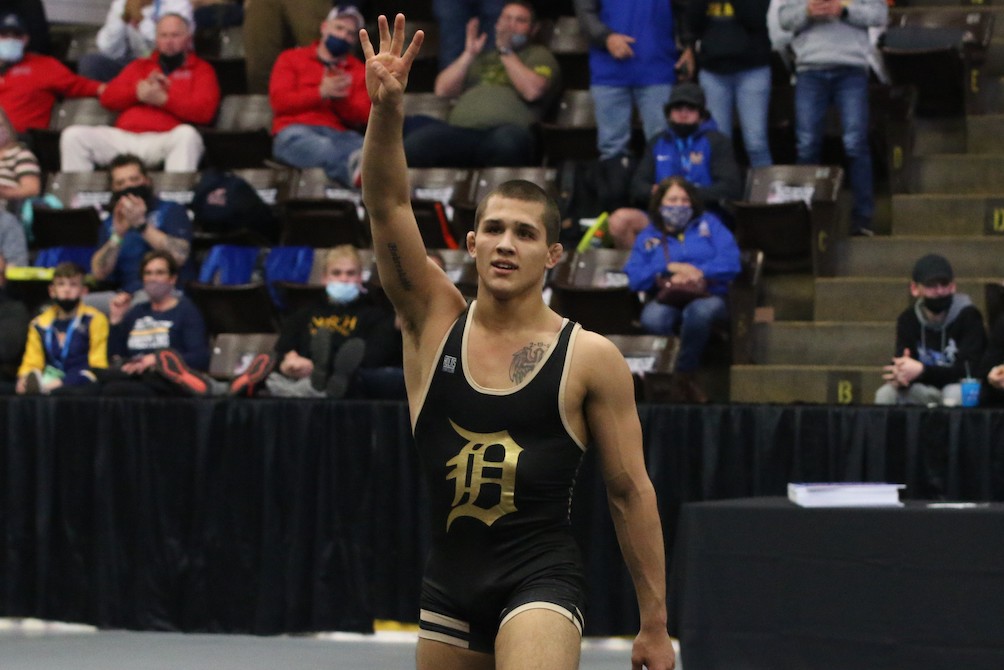
Facundo Finishes Unforgettable Run as 30th 4-Time Champ
By
Geoff Kimmerly
MHSAA.com senior editor
April 4, 2021
KALAMAZOO – Alex Facundo’s wrestling career has taken him around the country and across the Atlantic Ocean, and long ago into consideration as one of the top high school wrestlers in the nation regardless of weight class.
But there’s no way this week doesn’t remain a cherished memory even after Facundo leaves for Penn State and encounters more higher-level opportunities that surely lie ahead.
On Tuesday, he led Davison to its first Division 1 team championship since 2006. On Saturday, returning to Wings Event Center, he capped his Cardinals career by becoming the 30th four-time individual champion in MHSAA Finals history.
“I just treat it like another match. But then I realized the specialness of it. Before I even looked over, I heard all the cheers and stuff,” Facundo said. “I mean, I’m going to miss this a little bit.”
Facundo (25-0) stacked a pin and two technical falls at 171 pounds Saturday, including 26-11 over Kalamazoo Central senior Leonardo Gallasso (30-2) in the championship match. He ended with a 132-2 career record and championships at 152, 160 and twice at 171.
“This week has been the best moment, the best week of my high school career,” Facundo said. “Not only winning the fourth (individual title), but winning the team state title that we haven’t won in 15 years. That’s just special. That’s never going to leave us. That’s never going to leave my name – they’re going to hear four-timer, but they’re also going to hear the 2021 Davison wrestling team.”
103
Champion: Justin Gates, Davison, Fr. (23-0)
Decision, 8-4, over Caleb Weiand, Macomb Dakota, Soph. (31-1)
Not long after Facundo finished his fourth championship run Saturday, Gates capped his first.
He reached this title match with a pair of pins and a technical fall before handing Weiand his only defeat of this season.
“Nothing really compares – it’s been honestly one of the best weeks of my life,” Gates said. “I’m just hoping I can follow in (Facundo’s) footsteps. Obviously, Josh Barr just won his second next to him, and after that Jimmy Colley got his first. So, it’s a special team we’ve got here.”
112
Champion: Drew Heethuis, Detroit Catholic Central, Soph. (30-0)
Decision, 9-5, over Zach Phifer, Howell, Sr. (32-5)
DCC junior Anthony Walker and sophomore Clayton Jones finished fourth and sixth, respectively, at 119 on Saturday. They also received assists for training Heethuis up on the way to his first Finals championship.
“It’s pretty much all the difference – being able to have good partners and good people to work with and go against, it’s a main factor in being able to be good and get to the next level,” Heethuis said.
After finishing third at 103 last season, Heethuis did take those next steps with a perfect run.
“It’s kind of expected. I just want to get where I can be at the best I can,” he said. “This is what I’ve been working for my whole life.”
119
Champion: Caden Horwath, Davison, Soph. (27-0)
Decision, 6-2, over Louden Stradling, Battle Creek Lakeview, Soph. (29-1)
These two also met in the 103-pound championship match last season. The result was nearly identical this time after Horwath had won the 2020 bout with a 7-2 decision.
He reached Saturday’s finale with two pins and a major decision.
“(I was) just working hard, pushing my pace, making sure I get to all of my attacks,” Horwath said. “Not worrying about what they were doing, just try to wrestle my match and how I want to.
“Not too much (was different this season) – just getting better and better, critiquing little things.”
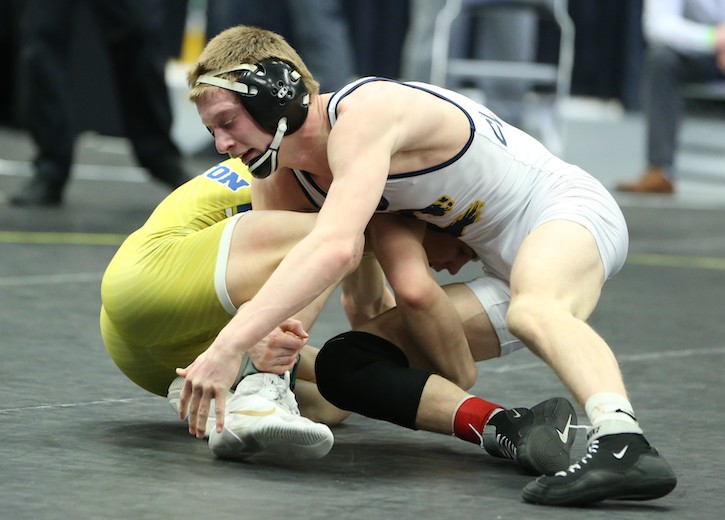
125
Champion: Ashton Anderson, Clarkston, Sr. (26-4)
Decision, 9-2, over Andrew Hampton, Rochester Hills Stoney Creek, Sr. (34-4)
The last conversation Anderson had with his late grandfather Pete Vandermeer was about making weight. That was only a couple of years ago, and Anderson knew he was watching Saturday – “I wanted to do it for him,” Anderson said. “He’s smiling down at me.”
It surely was a proud family moment, as Anderson not only avenged a 5-1 Regional loss to Hampton to defeat the top seed this time, but in the process became the sixth member of his family to wrestle in an MHSAA Final and third to win a title for Clarkston – joining uncles Jerry Anderson (1993), Matt Vandermeer (2011) and Nick Vandermeer (2013).
Ashton also was thinking Saturday of last season’s Finals, when he fell in his first match at 125 by a 13-11 decision, then fought all the way back to finish third.
“I was supposed to be in the Finals last year, and I lost early and didn’t get to make it, and it’s my last chance,” Anderson said. “I wasn’t letting it slide by.”
130
Champion: Brendan Ferretti, Macomb Dakota, Sr. (33-0)
Decision, 6-3, over Tyler Herrema, Grandville, Sr. (30-1)
The joy was all over Ferretti’s face as he finished his high school career by joining the short list of three-time Finals champions.
After placing third at 103 as a freshman, Ferretti won titles at 112, 119 and now 130, with a combined 121-1 record over those championship seasons.
“It was honestly about having fun, because it’s my last year … and honestly just trying to get through the year with all of this COVID stuff,” Ferretti said. “We only got half a season to train for this, so it does feel pretty good, knowing that I’m winning because I worked hard in the room and stuff like that. It all pays off. Now it’s time to take it to the next level.”
Ferretti will be wrestling next season at the U.S. Naval Academy.
135
Champion: Dylan Gilcher, Detroit Catholic Central, Soph. (26-1)
Decision, 3-0, over Evan Herriman, Davison, Soph. (22-3)
These two met to close Davison’s Team Finals win on Tuesday, with Gilcher winning 5-2, and the rematch was even more low-scoring.
But Gilcher scored enough and also his second championship, adding to the title won a year ago at 112.
“I wrestling him twice earlier, so I knew I could get a takedown. I wasn’t as busy as I like, but I was in control. I felt safe,” Gilcher said. “I rode this time – last time I didn’t ride – so I got less points. But like I said, it was safe.”
Gilcher’s first three matches Saturday were far more high-scoring – he put up 18, 21 and 22 points in three tech falls.
140
Champion: Mason Shrader, Brighton, Sr. (31-0)
Decision, 7-1, over Philip Burney, Detroit Catholic Central, Sr. (22-4)
Shrader had been all around a championship his first three seasons, finishing sixth at 103 as a freshman, eighth at 119 as a sophomore and second last season at 125.
In his final high school match, Shrader arrived and earned a spot at the top of the podium.
After falling in that 2020 championship match, Shrader made a deal with himself that he wouldn’t lose this time. He hardly slept Friday night thinking about the opportunity.
“I’ve been working so hard since last year, since I lost in the Finals,” Shrader said. “The past three years, my mindset was nowhere near where it is right now. I wanted it so bad, and I just put my mind to it and got it done.”
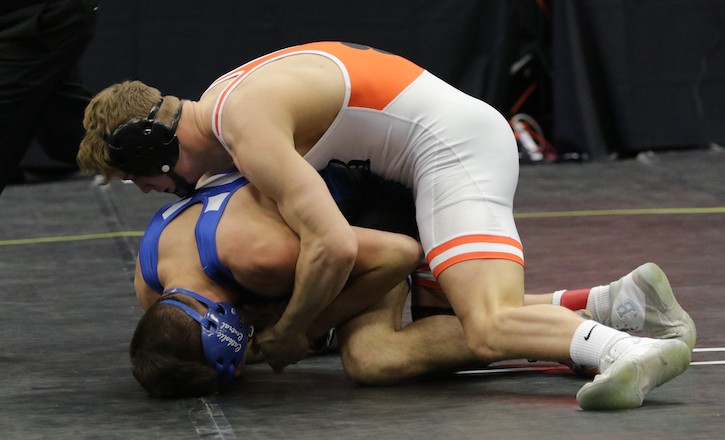
145
Champion: Darius Marines, Detroit Catholic Central, Fr. (17-2)
Decision, 5-3, over Camden Trupp, Detroit Catholic Central, Sr. (23-3)
Very rarely, the Individual Finals pits teammates against each other. Marines and Trupp met in the championship matches at every level of this tournament, with Trupp winning 3-1 at the District and Marines taking the Regional 5-2.
“First one I was a little nervous, you know, (facing the) senior captain,” Marines said. “Second time, I knew what I was expecting.”
This time? “Nerves, everything. I was just thinking about standing on that podium and getting that trophy. That’s all I had in mind.”
During Tuesday’s Team Finals, Marines bumped up to 152 while Trupp wrestled at 145. Combined they finished 5-1 that day winning with three pins, a tech fall and a decision.
152
Champion: Trenton Wachter, Rockford, Sr. (24-1)
Fall, 5:17, over James Johnston, Davison, Sr. (25-3)
The final minute was ticking down and Wachter was a few points behind, a runner-up finish shaping up as the likely result.
In an instant, everything changed.
“I just felt his head, way too high, took it over, pinned him,” Wachter said. “I get in that position a lot in practice, so I’m used to it.”
They’d wrestled a similar match Tuesday, which Wachter won 7-5 in sudden victory after trailing 5-1.
The title finished a nice climb for Wachter, a fifth-place finisher at 130 as a sophomore and third-place finisher at 140 last season.
160
Champion: Josh Barr, Davison, Soph. (26-0)
Major Decision, 9-1, over Gary Nilson, Utica Ford, Sr. (21-2)
Moments after Facundo won his fourth championship, Barr reached the halfway point in pursuit of the same – and with a second-straight undefeated season.
“I love this man right here; he’s my training partner every single day,” Barr said as Facundo offered a quick congratulations. “That’s the person who trains me for every single situation to help me out on any mat I ever step foot onto.”
Barr will be among those who will be looked toward next, especially as Davison returns next season as the reigning team champion.
“Just keeping the momentum going,” he said. “On Tuesday we just won a team state title, and it was a great thing to do with my brothers. Keep winning team state titles, keep winning individual titles. Break some records here. … Keep pushing the pace.”
189
Champion: Manuel Rojas, Detroit Catholic Central, Jr. (29-2)
Decision, 11-5, over Remy Cotton, Traverse City Central, Soph. (28-1)
Cotton was the top seed and Rojas the second, and they reached the championship match with a combined five pins and a tech fall.
Rojas also was the reigning champion at this weight, and now he’ll head into his final season with a chance to join that three-timer list.
“Nothing’s different. Just getting to come out here and do the same job,” Rojas said comparing this season’s run to last. “Same job every year.
“Maybe getting to train a little bit harder every year. Get a little better. That’s it. Just getting better.”
215
Champion: Jimmy Colley, Davison, Jr. (19-1)
Fall, 1:00, over Ethan Green, Howell, Sr. (28-3)
Colley was one of six Davison top seeds entering Saturday, after finishing fourth as a freshman and third last season both at this weight.
“Nothing better than as a team having that bond, winning together, everybody excited, coming here excited, ready to wrestle. Everybody came here to win,” Colley said. “We all grew up together. Everybody knows each other, practice partners. It’s just great to know you’re practicing with the best guys in the state.”
He added a first place to his list with a quick pin, becoming Davison’s third champ of the day.
“I went out there pretty quick, took him down, got to my underhook, where I know I’m good there, got my takedown,” Colley said. “My goal was to go out there and dominate the match.”
285
Champion: Jayson Roy, Jackson, Sr. (31-0)
Decision, 4-0, over Joshua Terrill, Holt, Jr. (25-4)
Roy will not be soon forgotten by Jackson wrestling. And he’s hopeful what he accomplished Saturday helps the program for years to come.
Roy became the Vikings’ first Finals champion since 1975.
“I’ve always known I could do it. I’m glad I finally did,” Roy said. “I thought it was going to be last year. I lost to Nick (West of Lincoln Park) in the second round, came back (and defeated him), took third. I knew I was winning it this year. I wasn’t going to let anybody stop me.”
He’s also hopeful his championship run will spark the sport at his school.
“It will encourage people to come out and try it,” he said, “get some better wrestlers in there next year.”
PHOTOS: (Top) Davison’s Alex Facundo raises the traditional four fingers signifying his fourth Finals title Saturday at Wings Event Center. (Middle) Clarkston’s Ashton Anderson works to get control of his opponent’s legs at 125 pounds. (Below) Brighton’s Mason Shrader applies some leverage during his championship match win at 140. (Click for more from HighSchoolSportsScene.com.)
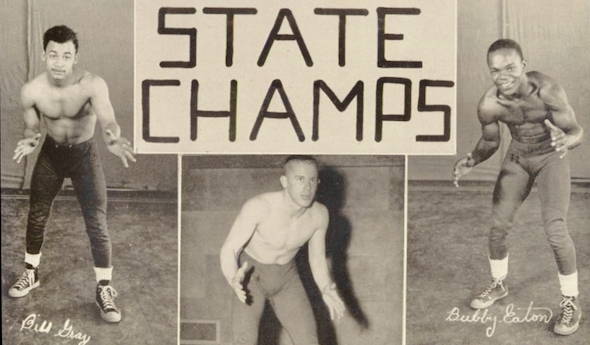
Old 5-A League Fueled Wrestling's Rise
June 29, 2020
By Ron Pesch
Special for Second Half
This latest quest into wrestling began with an inquiry, as these projects often do.
My work with the MHSAA – which includes the title ‘historian’ – is mostly a hobby that began many years ago. The diversion often gets me into press boxes and places the average sports fan doesn’t usually get to venture. Now and then, I get to talk into a microphone. But mostly, it is hours of digging; pouring through scrapbooks, yearbooks and newspapers, old and new, as I search for names, details and stories lost in time. The pursuit sometimes leads to awkward phone calls, e-mails and messages where I try to describe who I am and why I’m chasing a phone number for someone, a person’s mother or father, grandmother or grandfather.
I adore the chase and resolving mysteries. I love visiting libraries and schools and delight in connecting with people. I love filling in holes and connecting dots. I’m a computer guy by trade, focused on analyzing and aligning data. I equate sports searches to detective work, and for fans of old television, I’m like Columbo without the trench coat or cigar, always asking, “Just one more thing …”
Wrestling
My first visit to the sport was in junior high gym class. That’s when Coach Murphy paired me up against another undersized classmate. With the shrill of a whistle, we battled it out on a deep red colored mat – representative of one half of the red and grey school colors of Nelson Junior High. The struggle lasted for no more than a matter of seconds. With a slap of a mat, or perhaps another whistle, it was over. I lost by ‘fall’ – the gentler way of saying I was pinned.
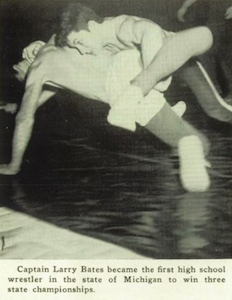 My second visit to the sport came in high school. That’s when the wrestling coach stopped me in the hall one day to suggest I join the wrestling team. Apparently, word of the skills I demonstrated at Nelson hadn’t travelled the half mile east from the junior high to the high school. Quickly recognizing this fact, I told him it might be counter-productive, as I wasn’t much of a wrestler. He was undeterred. Because I was still undersized, he said, I would likely win a fair number of matches. Many schools, it seemed, struggled to find someone to wrestle in the lower classes, and hence, would have to forfeit. I still turned him down.
My second visit to the sport came in high school. That’s when the wrestling coach stopped me in the hall one day to suggest I join the wrestling team. Apparently, word of the skills I demonstrated at Nelson hadn’t travelled the half mile east from the junior high to the high school. Quickly recognizing this fact, I told him it might be counter-productive, as I wasn’t much of a wrestler. He was undeterred. Because I was still undersized, he said, I would likely win a fair number of matches. Many schools, it seemed, struggled to find someone to wrestle in the lower classes, and hence, would have to forfeit. I still turned him down.
I give credit to the Coach Erickson. He was trying to involve a kid in athletics that wasn’t going to make the football, basketball or track team. But that bit of wisdom didn’t hit me until long after high school.
As the above may demonstrate, an extensive understanding of the intricate particulars of wrestling isn’t my strong suit. I’ve attended only one MHSAA Wrestling Final. That visit still remains among my favorite sports sights. The pageantry of the Grand March staged before the orchestrated pandemonium of the MHSAA wrestling championship combined with huge crowds and inspiring athleticism creates a spectacular event.
The Latest Project
Recently, a question, relating to past individual champions from the earliest days of the championships, arrived at the MHSAA office. The Association has awarded wrestling titles since 1948, and a list of team champions and runners-up from the beginning to the present appear on the MHSAA Website. Missing, however, are the names of the individuals who won championships between 1948 and 1960.
To find an answer, that meant a deep dive into newspapers, yearbooks and old wrestling guides to exhume the particulars from articles and agate, cross-referencing results, matching last names to first names, correcting spellings and occasionally schools when obvious errors have been made.
Technology has helped carve away some time and travel when embarking on such a project. Once, the only way to dig out such information was to travel to microfilm, and then spend hours scrolling past print. Today, thanks to some online archives, even during a global pandemic, we can visit a handful of Michigan newspapers via the internet. Tack on the ability to search the online cloud of information, intriguing elements intermittently bubble to the surface, transforming a standing list of names and schools to an account that brings at least some names to life.
The Beginnings
An initial look at the existing team championship listings revealed the first fact. For all intents and purposes, the earliest days of the MHSAA wrestling state championships served as a glorified meet for the members of the 5-A Conference. The league, comprised of Ann Arbor, Battle Creek Central, Jackson, Lansing Eastern and Lansing Sexton high schools, was where wrestling as a prep sport first gained traction in Michigan. Almost immediately, Greater Lansing established a stronghold on the sport that would last those first 13 years.
From 1948 to 1960, there was only one classification in which all schools, regardless of size, competed. In 10 of those 13 years, one of two Lansing high schools – Eastern or Sexton – won the state’s mat championship. In the three years when a Lansing team didn’t win, they finished as runner-up. Those three were part seven total of that baker’s dozen when either Eastern or Sexton finished second.
Growth in Michigan
The first championship tournament in 1948 involved around a dozen schools. While expansion into other schools commenced slowly, by 1957, wrestling had progressed into the fastest growing sport in Michigan.
“The sport blossoms into many new schools every year,” stated George Maskin in a January issue of the Detroit Times in 1957. “Best estimates are that at least 60 varsity prep teams now are in competition. The figure should come close to the 100 mark within a year or two. Prep wrestling has grown with such swiftness it now is necessary to hold regionals to determine qualifiers for the state meet.
“It is not the kind of wrestling one has watched on television or in some of the professional arenas around the state,” he added, trying to educate the public about the difference between the prep sport and the form of broadcast entertainment then popular. “Groans and grunts have no part in high school wrestling … nor does hair pulling or stamping the feet … or pointing a finger into the referee’s eye.”
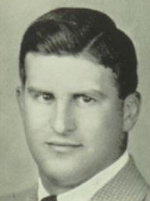 Coaches of wrestling noted that it was one of the few sports offered that gave equal opportunity to students regardless of their physical build. Separated into 12 weight classifications, running from 95 pounds and under up to the unlimited, or heavyweight division, there was a place for all.
Coaches of wrestling noted that it was one of the few sports offered that gave equal opportunity to students regardless of their physical build. Separated into 12 weight classifications, running from 95 pounds and under up to the unlimited, or heavyweight division, there was a place for all.
“Take the kid who weighs 95 pounds,” Ignatius ‘Iggy’ Konrad, a former wrestler at Michigan State and the coach at Lansing Sexton, told Maskin. “He’ll participate against a boy of similar weight. Thus a kid whose athletic possibilities might appear hopeless (in other sports) finds a place for himself in wrestling.”
As the sport continued to expand, coaches were still trying to explain the worth.
“Parents should try to understand the difference between television wrestling and high school and college wrestling,” Grandville coach Kay Hutsell told a Grand Rapids Press reporter in December 1960. “There is no comparison. TV is 100 percent acting.”
A state champion wrestler as a high school student in Illinois, where spectator interest and participation was far greater than in those early days of wrestling in Michigan, Hutsell twice lettered in the sport at Indiana University.
“Wrestling is a conditioner and perhaps develops the body better than any other sport. About the only way wrestling can educate the adults (in the western Michigan area about the sport) is through newspapers.” He felt people should come to “see for themselves.”
The Tournament
Lansing Sexton won the state’s inaugural team wrestling title, 54-43 over the Ann Arbor Pioneers, with the event run off on the mats of the University of Michigan in 1948. Both Floyd Eaton at 127 pounds and Carl Covert at 133 ended the year undefeated for the Big Reds. Five wrestlers from each school earned individual titles that first year. Jackson’s heavyweight, Norm Blank, scored a pin over Sexton’s Dick Buckmaster. The pair had split their two previous matches during league competition.
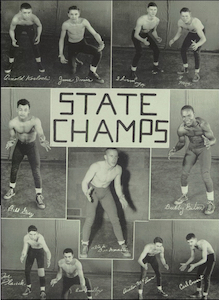 Ann Arbor grabbed the next two MHSAA team titles, both by a mere four points, first 60-56 over Sexton, then topping the Quakers of Lansing Eastern, 56-52, in 1950.
Ann Arbor grabbed the next two MHSAA team titles, both by a mere four points, first 60-56 over Sexton, then topping the Quakers of Lansing Eastern, 56-52, in 1950.
Eight wrestlers qualified for the final round for both Ann Arbor and Sexton in 1949, with five each earning championships. Both schools had three wrestlers finish in third and fourth place; hence the team title was awarded based on Ann Arbor tallying more pins. A total of 96 wrestlers from 11 schools participated in the tournament. Ted Lennox, wrestling at 95 pounds, became the first athlete from the Michigan School for the Blind to compete for an individual title but was defeated by Sexton’s Leo Kosloski. Lennox would later wrestle for Michigan State.
In 1950, nine Ann Arbor wrestlers advanced to the final round with six seizing championship medals, but only Sam Holloway repeated as champion from the previous year. Teammate Jack Townsley, who had won in 1949 at 112 pounds, finished second at 120.
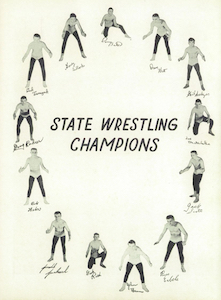 Eastern and coach Don Johnson grabbed the first of two consecutive titles in 1951, topping Ann Arbor, 56-52, with East Lansing finishing a distant third with 26 points. Pete Christ of Battle Creek Central became the first Bearcat (and only the second athlete from a school other than Eastern, Sexton or Ann Arbor) to bring home an individual wrestling title, with a decision over Lansing Eastern’s Vince Malcongi in the 140 classification. “The Bearcat matmen took fourth in the State,” according to the Battle Creek yearbook. “Mr. Donald Cooper took over the coaching duties when Mr. Allen Bush was called to the Marines.” (Bush would later serve as executive director of the MHSAA).
Eastern and coach Don Johnson grabbed the first of two consecutive titles in 1951, topping Ann Arbor, 56-52, with East Lansing finishing a distant third with 26 points. Pete Christ of Battle Creek Central became the first Bearcat (and only the second athlete from a school other than Eastern, Sexton or Ann Arbor) to bring home an individual wrestling title, with a decision over Lansing Eastern’s Vince Malcongi in the 140 classification. “The Bearcat matmen took fourth in the State,” according to the Battle Creek yearbook. “Mr. Donald Cooper took over the coaching duties when Mr. Allen Bush was called to the Marines.” (Bush would later serve as executive director of the MHSAA).
Johnson’s squad absolutely dominated the field in 1952, topping Sexton the next year, 68-43. Ann Arbor followed with 39 points. Seven Quakers – George Smith (95), Herb Austin (103), Jim Sinadinos (127) Bob Ovenhouse (133), Bob Ballard (138), Ed Cary (145) and Norm Thomas (175) – all won their final matches. Both Austin and Sinadinos were repeat champions.
Sexton flipped the table in 1953 with a 67-46 win over Eastern. Ten Big Reds competed for individual state championships among the 12 classifications, with five taking home titles. The Big Reds’ Ken Maidlow, jumping from 165 pounds to 175, and Eastern’s Ed Cary, who moved up to 154, both repeated as medal winners. In the heavyweight class, Sexton’s Ray Reglin downed Steve Zervas from Hazel Park. (Zervas, a two-time runner-up, later wrestled at the University of Michigan, then coached wrestling at Warren Fitzgerald for 34 seasons and served as mayor of Hazel Park from 1974 to 1986).
In 1954, Ossie Elliott of Ypsilanti and Henry Henson of Berkley became the first wrestlers from non 5-A schools to win individual state wrestling titles. Elliott, who had finished as state runner-up in 1953 at 133 pounds, downed Lansing Sexton’s Tom Holden in the same classification. Henson earned a decision over Lansing Eastern’s Ken Bliesener at 154 pounds. Eastern again returned to the winner’s circle, outdistancing Sexton, 60-44. Ypsilanti finished third with 34 points.
By 1955, athletes from 28 high school teams were battling for state team and individual honors on the mats at MSC’s Jenison Field House. As a senior captain, Lansing Eastern’s Larry Bates pinned four out of five opponents in the 112-pound class to become Michigan’s first wrestler to earn three state crowns. Bates grabbed his first title in 1953, competing at 95 pounds, followed by his second in 1954 at 103. Eastern picked up its second-straight team trophy, racking up 102 points on the way to a fourth crown in the eighth year of championships. For the first time, a non-5-A school finished second, as the Ypsilanti Braves grabbed runner-up honors with 84 points.
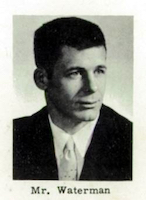 Coach Bert Waterman led Ypsilanti to the first of four championships during a 10-year span in 1956. Two Braves, Ambi Wilbanks and Walt Pipps, earned titles while three others finished second in their classifications. Ypsi had lost one dual meet during the regular season, to Lansing Eastern, by a slim three-point margin. With the 1967-68 school year, Waterman would embark on a 24-year career as coach at Yale University after posting a 192-35-4 mark in 16 seasons at Ypsilanti. A 1950 graduate of Michigan State, the former Spartans wrestler would join Eastern’s Don Johnson, Sexton’s Iggy Konrad, Fran Hetherington from the School for the Blind and two other high school coaches as a charter member of the Michigan Wrestling Hall of Fame in November 1978.
Coach Bert Waterman led Ypsilanti to the first of four championships during a 10-year span in 1956. Two Braves, Ambi Wilbanks and Walt Pipps, earned titles while three others finished second in their classifications. Ypsi had lost one dual meet during the regular season, to Lansing Eastern, by a slim three-point margin. With the 1967-68 school year, Waterman would embark on a 24-year career as coach at Yale University after posting a 192-35-4 mark in 16 seasons at Ypsilanti. A 1950 graduate of Michigan State, the former Spartans wrestler would join Eastern’s Don Johnson, Sexton’s Iggy Konrad, Fran Hetherington from the School for the Blind and two other high school coaches as a charter member of the Michigan Wrestling Hall of Fame in November 1978.
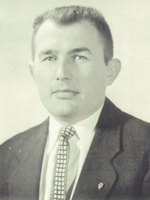 Runner-up in 1956, Eastern grabbed another title in 1957 topping Battle Creek Central, 93-89, in the tournament standings. It was a surprise “going away present” for Coach Don Johnson, who was stepping away after 10 seasons of coaching the Quakers to accept the assistant principal position at Eastern. Battle Creek had five wrestlers advance, and held a 56-48 lead over Eastern as the teams entered the final round. The Quakers’ Ted Hartman opened the day with a victory in the 98-pound weight class, helping Eastern post a 3-1 record in championship round matches. Sexton assisted with the Eastern victory when Norm Young defeated Battle Creek’s Bob McClenney in the 120 weight class. The Bearcats, who had five wrestlers in the finals, ended with two individual champs on the day and their highest finish in their 10 seasons of wrestling.
Runner-up in 1956, Eastern grabbed another title in 1957 topping Battle Creek Central, 93-89, in the tournament standings. It was a surprise “going away present” for Coach Don Johnson, who was stepping away after 10 seasons of coaching the Quakers to accept the assistant principal position at Eastern. Battle Creek had five wrestlers advance, and held a 56-48 lead over Eastern as the teams entered the final round. The Quakers’ Ted Hartman opened the day with a victory in the 98-pound weight class, helping Eastern post a 3-1 record in championship round matches. Sexton assisted with the Eastern victory when Norm Young defeated Battle Creek’s Bob McClenney in the 120 weight class. The Bearcats, who had five wrestlers in the finals, ended with two individual champs on the day and their highest finish in their 10 seasons of wrestling.
An All-American wrestler at Michigan State, Johnson would remain at Eastern throughout his education career, retiring as principal in 1983. The fieldhouse at Eastern was named after him in December 1984, fittingly just prior to the championship round of the annual Eastern High Wrestling Invitational.
Eastern again went back-to-back, topping Sexton, 88-57, with Ypsilanti third in the 1958 championship standings. The meet, culminating with 16 boys competing in each weight division – four each from regionals hosted at Battle Creek, Lansing, Ypsilanti and Berkley – was held at the Intramural Building at the University of Michigan. Both Eastern and Sexton advanced four wrestlers to the final round, with Eastern’s Gary Gogarn (95), Ron Parkinson (145) and Alex Valcanoff (154) earning titles. For Sexton, Fritz Kellerman (133) and Wilkie Hopkins (138) finished on top.
The 1959 championships, hosted at the new intramural building at MSU, found boys from 47 schools chasing medal honors.
“Points toward the team title are awarded one for each bout won, with an extra point for a fall,” noted the Lansing State Journal, explaining the mechanics of the tournament. “The big scoring chance comes (in the final round) with a first place netting 10 points, second 7, third 4 and fourth 2.”
Jackson and Sexton had tied for the 6-A Conference crown (the league renamed with the addition of Kalamazoo Central to the mix) and the race to the MHSAA title was expected to be a tight one. Jackson qualified seven for the semifinal round, with four advancing to the championships. The Big Reds sent five wrestlers to the last round. Vikings Ron Shavers (95), Nate Haehnle (145) and Don Mains (165) had each won matches, while Sexton’s qualifiers Tom Mulder (127) and Emerson Boles (175) had earned titles.
With one match remaining, Jackson trailed Iggy Konrad’s Big Reds by four, 67-63, as the Vikings’ Ed Youngs – the state’s reigning heavyweight champion – squared off with Sexton’s Mickey Devoe. Youngs grabbed a 3-1 decision to repeat, but the Vikings needed a fall in the match for a tie. Hence, the Big Reds eked out a single-point victory, 74-73, to escape with their third state mat title.
The results of the title round of the 1960 tournament, also won by Sexton, telegraphed how far the sport had come. Wrestlers from a dozen high schools squared off for honors in the title matches, with winners representing 10 cities. The Big Reds topped Ypsilanti 70-64, followed by Kalamazoo Central with 56 points. Eight other schools had scored at least 20 points in the tournament; 31 teams had scored at least a point. Tom Mulder of Sexton was the lone repeat champion.
With 112 schools now offering wrestling on their sports menu, the MHSAA split the event into two parts for the 1959-60 school year, with Class A set for the University of Michigan and Class B hosted by Michigan State University. The sport was now in full bloom.
 Ron Pesch has taken an active role in researching the history of MHSAA events since 1985 and began writing for MHSAA Finals programs in 1986, adding additional features and "flashbacks" in 1992. He inherited the title of MHSAA historian from the late Dick Kishpaugh following the 1993-94 school year, and resides in Muskegon. Contact him at [email protected] with ideas for historical articles.
Ron Pesch has taken an active role in researching the history of MHSAA events since 1985 and began writing for MHSAA Finals programs in 1986, adding additional features and "flashbacks" in 1992. He inherited the title of MHSAA historian from the late Dick Kishpaugh following the 1993-94 school year, and resides in Muskegon. Contact him at [email protected] with ideas for historical articles.
PHOTOS: (Top and 4) Lansing Sexton won the first MHSAA Finals in wrestling in 1948. (2) Eastern’s Larry Bates became the first three-time individual champion in MHSAA history in 1955. (3) The Big Reds were led by coach Ignatius Konrad. (5) Lansing Eastern kept the championship in the capital city in 1949. (6) Bert Waterman built one of the state’s top programs at Ypsilanti. (7) Don Johnson was the architect of Eastern’s program.(Photos gathered by Ron Pesch.)

